Consuelo Rubio Peralta is a highly quality focused producer in Jaén, Peru. This washed Sidra lot from her farm - Finca San Francisco - is nuanced and complex - and a testament to hard work and careful processing.
The Sidra variety itself is a relatively modern one with roots in Ecuador; which is widely considered to be closer related to Ethiopian landrace genetics, similar to other new-wave varieties such as Pink Bourbon and Gesha.
Brew Guide:
Best Brewed with: Filter
We’ve found this coffee to present the best complexity at a very light roast degree - preserving the variety characteristics. We recommend using soft water, and a similar approach as to our Encanto Gesha:
For fruitiness - 65g/L ratio (roughly 1:15) or go for complexity and elegance with a 55g/l (roughly 1:18). We recommend water just off boil for this coffee.
If brewing on Espresso, we recommend at least 3 weeks rest (time since the roast date) and pulling 1:3 ratio shots - like 18g in to 54g out in 25-30s.
We’re tasting: Soft, sweet aromatics of plum blossom, blackcurrant leaf and assam tea. The cup is led by raspberry cordial, guava and floral honey, with a malic rhubarb acidity. On cold there’s a complex orange soda note to the finish that reminds us of chinotto
Traceability:
Country of Origin: |
Peru |
Region: |
El Lirio, Jaén, Cajamarca |
Farm: |
Finca San Franscico |
Producer: |
Consuelo Rubio Peralta and her family |
Variety: |
Sidra |
Elevation: |
1800 MASL |
Process: |
Anoxic Washed: Ripe cherries picked with an average brix of 18%; pulped and fermented in a restricted oxygen environment for 40 hours until reaching a final pH of 4.0. Slow dried over 40 days in a parabolic drier in raised trays. |
Import Partner: |
Conscious |
Harvest |
Crop 23/24: Cherries picked from 20/08/2023 – 15/10/2023. Arrived UK: Dec 23 |
The Story
We came across indie importer “Conscious” via their founder Culiann’s triumph at the inaugural Extracted Development competition. Seeing that Culiann won using a Peruvian coffee he had imported, and that he was running a super considered, transparency driven single origin focused import concern - we reached out to discuss the upcoming Peruvian harvest. Having had a super productive call in September we realised our company values were aligned and we started discussing offer samples.
Conscious has been working with a small number of smallholder farmers in Peru, with strong relationship buying and a commitment to return year on year. The work they have put in championing these producers clearly shows - all coffees were at a minimum 85+ with perfect moisture and water activity. It was hard to whittle down to select the lots we would showcase, but in the end we selected 2 and made firm commitments.
The first is from producer Consuelo Rubio and her daughters Blanca and Roxana, and her son Richard. They have a small Finca in the village of El Lirio, which sits high up in the Andes in the Jaén province of Cajamarca. We love Peruvian coffees - they are capable of producing really concentrated, dense profiles, utterly unique for South America, and with a more traditional approach to processing than might be found in the competitive market of neighbouring Colombia.
Prior to the agrarian reforms initiated in Peru in 1969, the country's land ownership system was deeply entrenched in a semi-feudal structure, which had been in place for centuries. This system was characterised by a powerful landowning oligarchy, which maintained control over vast areas of land, exploiting the labour of campesinos (rural workers) and indigenous people. The landowners, or hacendados, held significant social and political influence, perpetuating a system where a small elite controlled the majority of productive land, while the majority of the rural population lived in poverty and had little or no land to call their own. Consuelo’s father was a farm manager on one of these estates
Agrarian reforms in Peru, particularly those initiated in 1969 by the leftist military government of General Juan Velasco Alvarado, were part of a broader movement across Latin America, where land redistribution was seen as a means to address long-standing social inequalities and injustices, particularly towards indigenous and peasant communities. Following these reforms, Consuelo and her husband purchased a parcel of the land Consuelo’s father had previously managed for an estate owner, planting their first plots of coffee trees in the 90s.
Their initial focus was on the cultivation of Typica, Caturra, and the rust resistant Timor hybrid, but a gift of Sidra plants from a friend of Consuelo’s late husband turned out to be an unexpected boon. Initially ignored, these plants turned out to be resistant to a rust outbreak on the farm. Further planting and picking separation found that the cup profile was excellent, and the variety has now become a significant part of the farm’s production.
The Sidra variety itself has an interesting history - thought initially to be a cross of Bourbon and Typica from a Nestlé run variety garden in Ecuador, recent genetic testing has shown closer similarity with Ethiopian landrace genetics. This attests to the unique flavour profile (fruity, bright, floral, often with a unique pleasant herbality) and similarity with other land-race varieties (Ethiopian genetics recently adapted to Central and Southern American conditions) such as Pink Bourbon, Gesha, and Ombligon.
Consuelo runs a tight ship at Finca San Francisco - her daughter Blanca has attended Q-processing courses, and the meticulous care taken with fermentation and processing shows. Rigorous picking, careful note taking and experimentation clearly show in the cup, and excellent drying protocols (40 days of slow drying for a washed coffee!) mean we think this coffee could well open up quite a bit further in the course of its run. It’s already showing huge potential at this very fresh stage

![[09] Peru - Consuelo Rubio's Sidra [CROP 23/24 ARCHIVE]](http://scenery.coffee/cdn/shop/articles/peru_sidra_shopify_1.png?v=1714047406&width=1100)
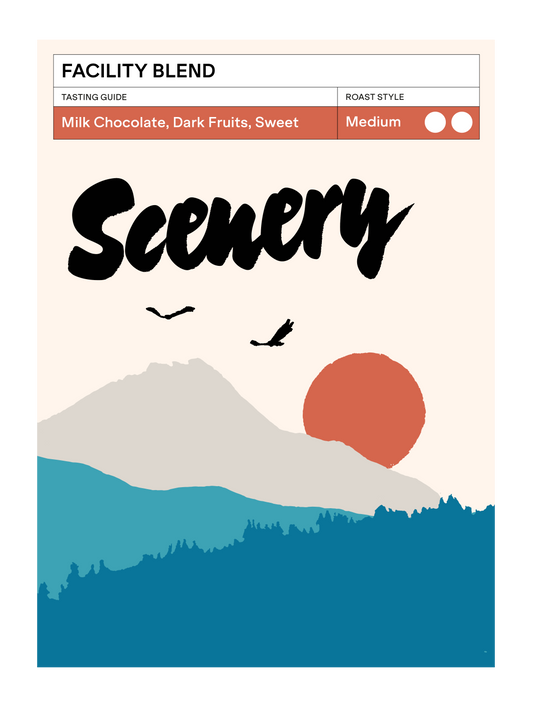


![Colombia - El Jaragual Espresso [25/26]](http://scenery.coffee/cdn/shop/files/colombia_el_jaragual_espresso_2526_shopify_02e82472-3443-4e5f-8e61-54b14caec36f.png?v=1756457993&width=533)
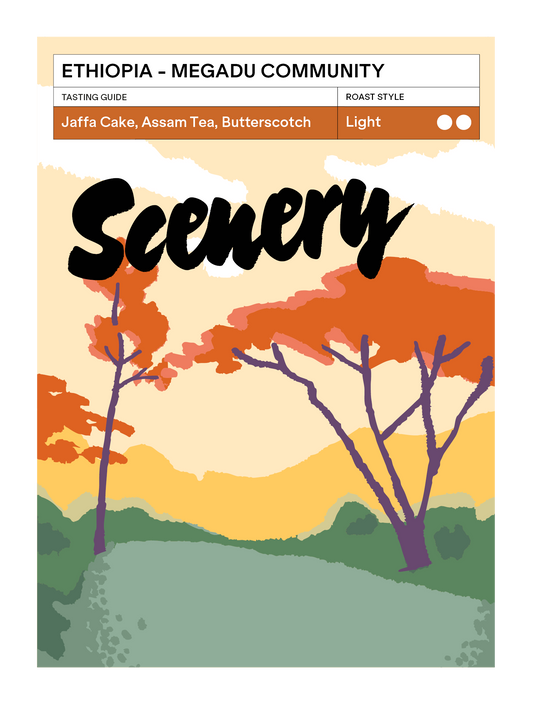
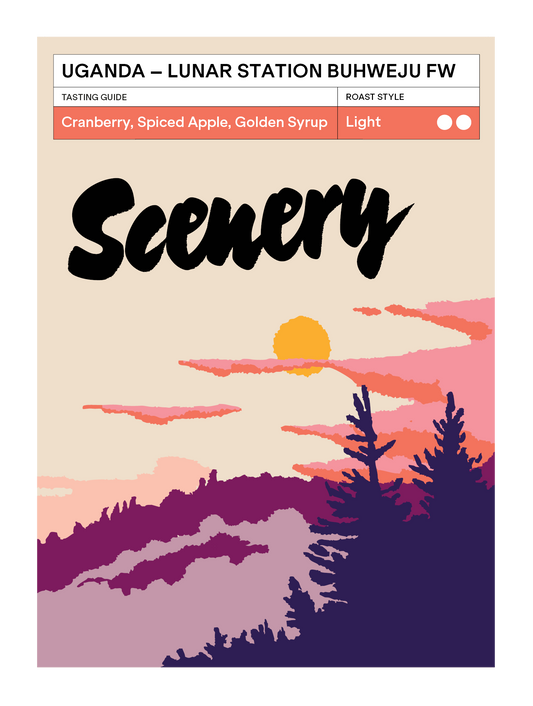
![Colombia - El Jaragual Rosado [25/26]](http://scenery.coffee/cdn/shop/files/el_jaragual_rosado_2526.png?v=1757075842&width=533)

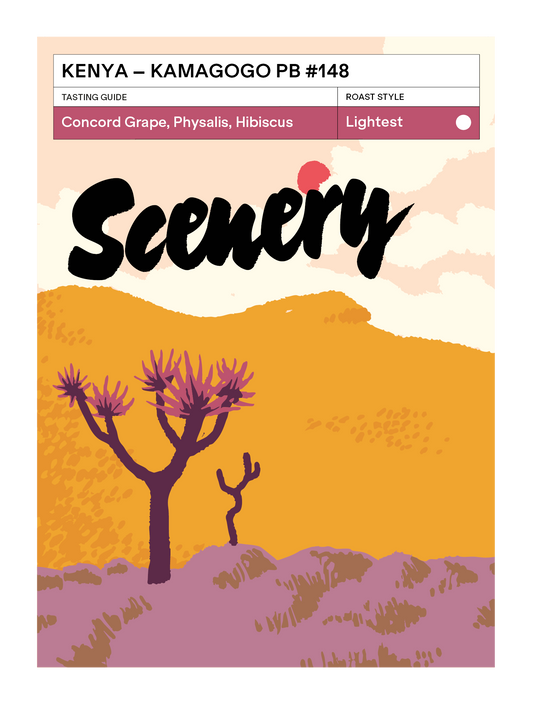
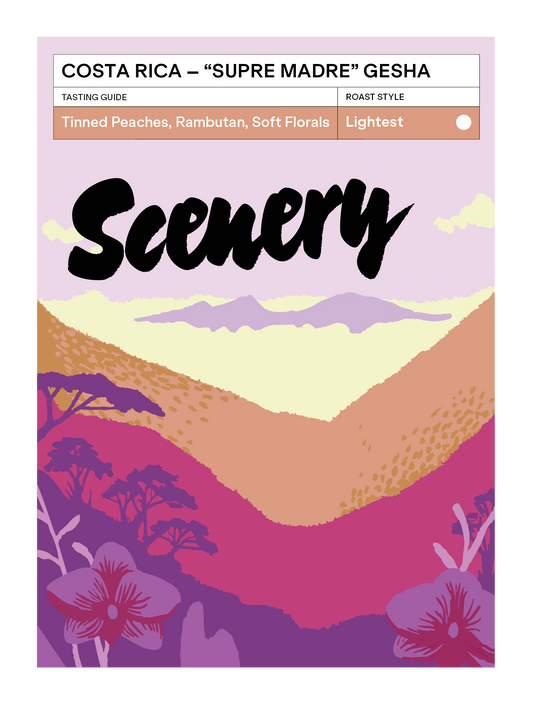
![Ethiopia - Bekele Belacho [24/25]](http://scenery.coffee/cdn/shop/files/ethiopia_bekele_belacho_2425_shopify.png?v=1756459151&width=533)
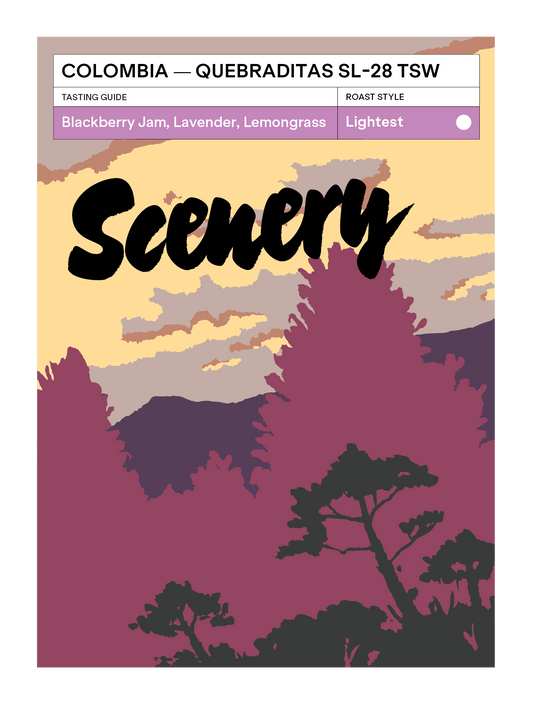
![Colombia - El Jaragual Caturra [25/26]](http://scenery.coffee/cdn/shop/files/colombia_el_jaragual_caturra_2526_shopify_fd4d2b46-1691-48f4-80e5-9a947ec22713.png?v=1756458088&width=533)

![Guatemala - Familia Primavera [24/25]](http://scenery.coffee/cdn/shop/files/guatemala_familia_primavera_2425_shopify_0daed525-97b3-4e51-af76-ea3775a71574.png?v=1756459482&width=533)
